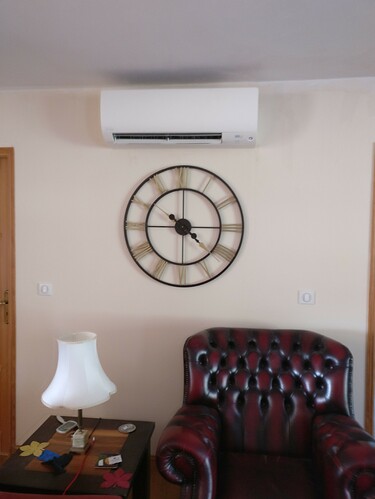Isn’t that the principle of the Canadian Well Mark?
When we bought our old stone house, it already had air pump heaters in every room, but it took a while to learn how to make best use of them. We now use them to quickly warm up a temporarily unused room in winter - maybe only on for ten minutes or so and at the opposite end of the spectrum, the dehumidifier mode is often more pleasant than air-conditioning when the outside temp rockets into the 40s.
They became an auxillary source of heating because we installed a woodburner with a convection duct that runs up three storeys and effectively heats most of the house. However there’s an important caveat, in that you’re a long way north of us, whereas we’re in an area where below freezing temps are very rare and I remember that in winter 2012, when we had our last severe frost the heat pumps weren’t sufficient. I think their effectiveness diminishes a lot if the temp is -C.10 or below, so it probably would be insufficient as your sole heat source.
Is that a night with a hot stick Graham ?
touché Peter 

If a Canadian well involves drilling/boring a couple of very deep holes, yes…
Well, well, well, who would have thought that’s what it was, this thread is getting a bit deep. 

Classic Graham, thanks for the memory. 

Yes, air to air or air to water? The OP has an existing central heating system so you’d think air to water but existing rads will be too small. You could remove the existing wet system and use air to air but will need some indoor wall space albeit higher up the wall where you have spare room.
Thank you @Corona - that makes things a lot clearer (to me, at any rate!) I don’t know about the OP’s situation of course but for us, as we have no radiators in any case, it would have to be air to air. I didn’t understand the difference so I know feel educated 
My understanding is that if you’re retrofitting these systems to house with existing CH radiators, all the radiators have to be replaced with much larger ones due to the far lower system temperature.
Gas/Oil CH system temperature will be around 80°C where as the ground/air pump systems lose efficiency above 40°C.
There’s also the matter of the electrical power consumption of such systems if you’re on an EDF Tempo scheme due to your properties electrical power requirements. Using your AC to cool the house on a Blue day in the summer is fine. Using ground/air heat systems to warm an old stone farmhouse during a week of Red days is going to be eye-wateringly expensive.
Our radiators are the really heavy old fashioned ones. I’m not adverse to removing them, but don’t want a lot of intrusive building work either.
Ours too, and we are having a 2nd one installed in a couple of weeks. Nice comfy looking chair though, and I sit alongside an exact replica of that table. Only difference is that mine is nowhere near as tidy. ![]()
Get advice from a pro about the efficiency of the heavy old radiators. I was told those types of rad would need replacing by more efficient models.
A lump of metal with 80c water in it is as efficient as any other lump of metal with water in it. The modern rads are much thinner so heat up much more quickly and of course cool down quickly. Some have fins along the back to increase the surface area so making it more comfortable warmth wise but in physics terms no more efficient. Effectivness maybe.
Half the water temperature, double the size of the surface area.
You can read all about mine here:
https://greg-harvey.medium.com/heat-pump-vs-gas-bd2913316abe
Short version, do it!
I think people talking about replacing radiators are talking about the standard sort of heat pump used for underfloor heating and so on, which only gets the water up to 50°C. The HT pumps - which, to my surprise, have been around for 10 years now! - are straight replacements for oil/gas boilers, no other change required. That said, upgrading to low volume radiators is never a bad idea and usually not too expensive. Will pay for itself quite quickly, as you heat up a lot less water to get the house to the same temperature.
Radiator booster fans make a big difference to comfort factor as well. Radiators simply do not radiate that well.
I would like to thank everyone for their input, it has been very educational. Greg, that is an amazing piece of information that you have provided!
I think that this is definitely the way forward for us.
Would you mind telling me how much it cost for your installation?
